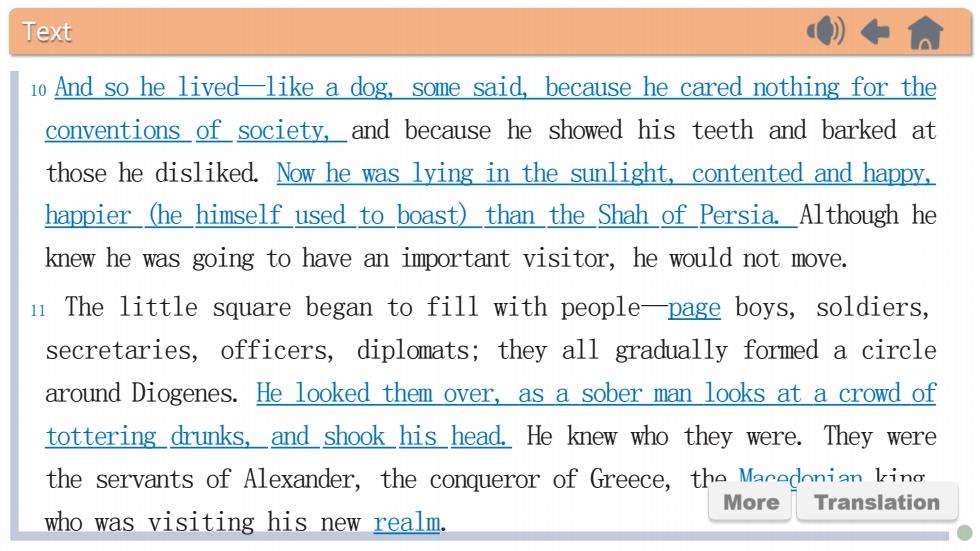
Text+食io And so he livedlike a dog, some said, because he cared nothing for theconventions of society, and because he showed his teeth and barked atthose he disliked. Now he was lying in the sunlight, contented and happy.happier (he himself used to boast) than the Shah of Persia. Although heknew he was going to have an important visitor, he would not move.ll The little square began to fill with people-pageboys,soldiers,secretaries, officers, diplomats; they all gradually formed a circlearound Diogenes. He looked them over, as a sober man looks at a crowd oftottering drunks, and shook his head. He knew who they were. They werethe servants of Alexander, the conqueror of Greece, the Maredonian lingMoreTranslationwho was visiting his new realm
10 And so he lived—like a dog, some said, because he cared nothing for the conventions of society, and because he showed his teeth and barked at those he disliked. Now he was lying in the sunlight, contented and happy, happier (he himself used to boast) than the Shah of Persia. Although he knew he was going to have an important visitor, he would not move. 11 The little square began to fill with people—page boys, soldiers, secretaries, officers, diplomats; they all gradually formed a circle around Diogenes. He looked them over, as a sober man looks at a crowd of tottering drunks, and shook his head. He knew who they were. They were the servants of Alexander, the conqueror of Greece, the Macedonian king, who was visiting his new realm. Text
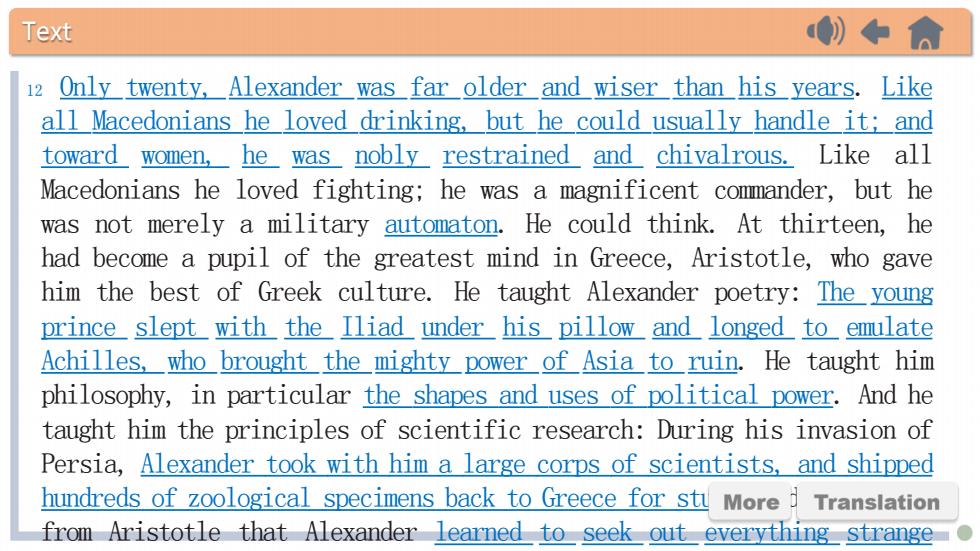
Text+食12 Only twenty,Alexander _was far older _and wiser than his years. Likeall Macedonians he loved drinking, but he could usually handle it; anctoward women,he wasnoblyrestrained and chivalrous.Like allMacedonians he loved fighting; he was a magnificent commander, but hewas not merely a military automaton. He could think. At thirteen,hehad become a pupil of the greatest mind in Greece, Aristotle, who gavehim the best of Greek culture.He taught Alexander poetry: The youngprince slept with the Iliad under his pillow and longed to emulateAchilles, who brought the mighty power of Asia to ruin. He taught himphilosophy, in particular the shapes and uses of political power. And hetaught him theprinciples of scientific research:During his invasion ofPersia, Alexander took with him a large corps of scientists, and shippedhundreds of zoological specimens back to Greece for stu More Translationfrom Aristotle that Alexander learned to seek out everything strange
12 Only twenty, Alexander was far older and wiser than his years. Like all Macedonians he loved drinking, but he could usually handle it; and toward women, he was nobly restrained and chivalrous. Like all Macedonians he loved fighting; he was a magnificent commander, but he was not merely a military automaton. He could think. At thirteen, he had become a pupil of the greatest mind in Greece, Aristotle, who gave him the best of Greek culture. He taught Alexander poetry: The young prince slept with the Iliad under his pillow and longed to emulate Achilles, who brought the mighty power of Asia to ruin. He taught him philosophy, in particular the shapes and uses of political power. And he taught him the principles of scientific research: During his invasion of Persia, Alexander took with him a large corps of scientists, and shipped hundreds of zoological specimens back to Greece for study. Indeed, it was from Aristotle that Alexander learned to seek out everything strange which might be instructive. Text
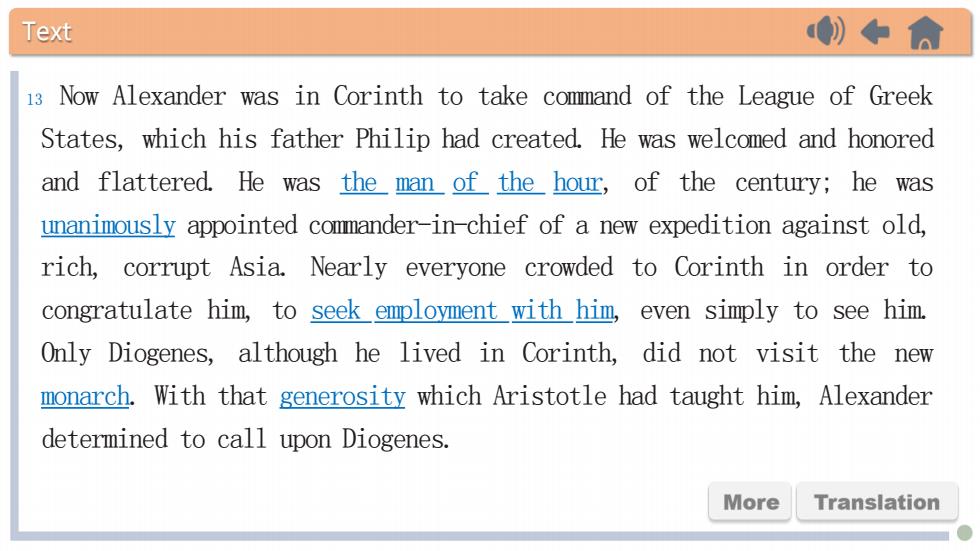
Text+食i3 Now Alexander was in Corinth to take command of theLeague of GreekStates.which his father Philip had created He was welcomed and honoredand flattered He was the_man ofthe_hour, of the century he wasunanimously appointed commander-in-chief of a new expedition against oldrich, corrupt Asia. Nearly everyone crowded to Corinth in order tocongratulate him,to seek employment with him,even simplyto see himOnly Diogenes, although he lived in Corinth, did not visit the newmonarch.Withthat generosity which Aristotlehad taught him, Alexanderdetermined to call upon Diogenes.MoreTranslation
13 Now Alexander was in Corinth to take command of the League of Greek States, which his father Philip had created. He was welcomed and honored and flattered. He was the man of the hour, of the century; he was unanimously appointed commander-in-chief of a new expedition against old, rich, corrupt Asia. Nearly everyone crowded to Corinth in order to congratulate him, to seek employment with him, even simply to see him. Only Diogenes, although he lived in Corinth, did not visit the new monarch. With that generosity which Aristotle had taught him, Alexander determined to call upon Diogenes. Text
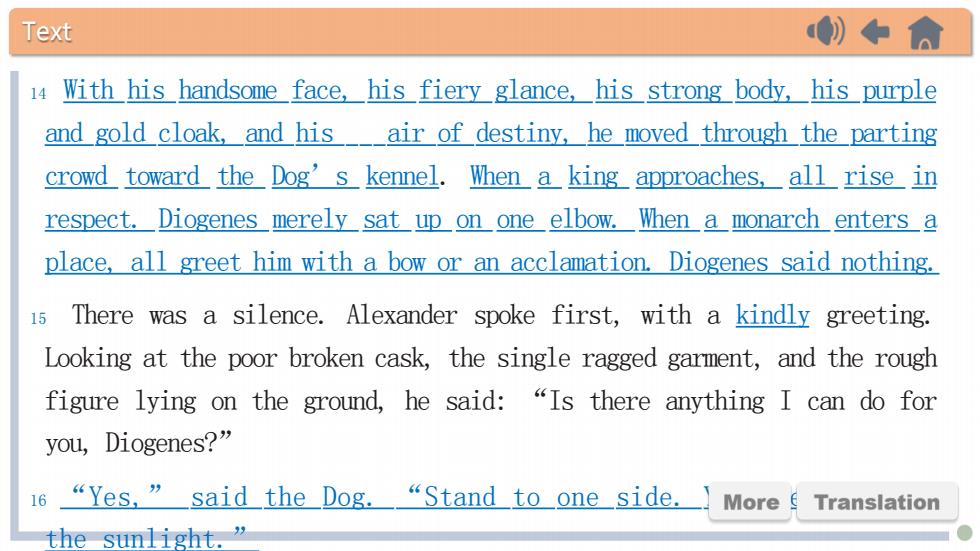
Text会14 With his handsome face, his fiery glance, his strong body, his purpleand gold cloak, _and his.--_air _of destiny,_he_moved through the_partingcrowd toward the Dog' s kennel. when a_ king_ approaches,_all rise inrespect.Diogenes_merely sat up on one_ elbow._When a_monarch enters_ aplace, all greet him with a bow or an acclamation. Diogenes said nothing.15 There was a silence. Alexander spoke first, with a kindly greeting.Looking at the poor broken cask, the single ragged garment, and the roughfigure lying on the ground, he said:“Is there anything I can do foryou, Diogenes?"“Yes,"Said the_Dog.“Stand to_one_side.) More Translation16thesiinlight
14 With his handsome face, his fiery glance, his strong body, his purple and gold cloak, and his air of destiny, he moved through the parting crowd toward the Dog’s kennel. When a king approaches, all rise in respect. Diogenes merely sat up on one elbow. When a monarch enters a place, all greet him with a bow or an acclamation. Diogenes said nothing. 15 There was a silence. Alexander spoke first, with a kindly greeting. Looking at the poor broken cask, the single ragged garment, and the rough figure lying on the ground, he said: “Is there anything I can do for you, Diogenes?” 16 “Yes,” said the Dog. “Stand to one side. You’re blocking the sunlight.” Text
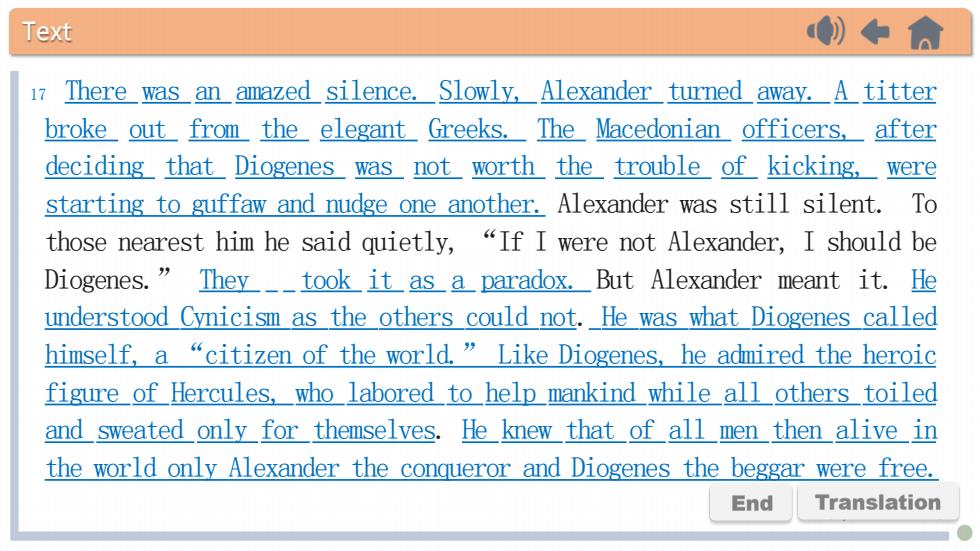
Text+食There_was _an amazed silence._Slowly,_Alexander turned away.A titter17brokeout_from theelegant_Greeks.The_Macedonian officers,_afterdecidingthat Diogenes_was not worth the_trouble_ of kicking,_werestarting to guffaw and nudge one another. Alexander was still silent. Tothose nearest him he said quietly,“If I were not Alexander, I should beDiogenes." They took it as a paradox. But Alexander meant it. Heunderstood Cynicism as the others could not. He was what Diogenes calledhimself, a “citizen of the world "” Like Diogenes, he admired the heroicfigure of Hercules, who labored to help mankind while all others toiledand sweated only for themselves. He knew that of all men then alive inthe world only Alexander the congueror and Diogenes the beggar were free.EndTranslation
17 There was an amazed silence. Slowly, Alexander turned away. A titter broke out from the elegant Greeks. The Macedonian officers, after deciding that Diogenes was not worth the trouble of kicking, were starting to guffaw and nudge one another. Alexander was still silent. To those nearest him he said quietly, “If I were not Alexander, I should be Diogenes.” They took it as a paradox. But Alexander meant it. He understood Cynicism as the others could not. He was what Diogenes called himself, a “citizen of the world.” Like Diogenes, he admired the heroic figure of Hercules, who labored to help mankind while all others toiled and sweated only for themselves. He knew that of all men then alive in the world only Alexander the conqueror and Diogenes the beggar were free. (1,520 words) Text